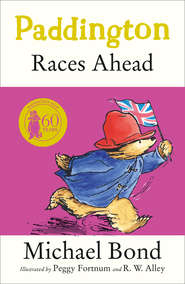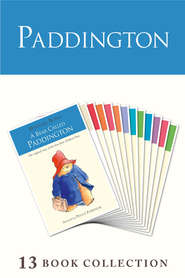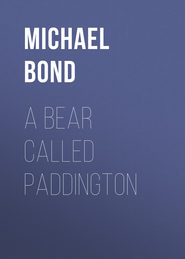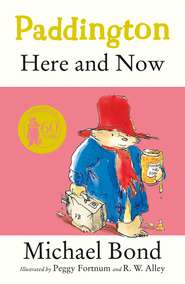По всем вопросам обращайтесь на: info@litportal.ru
(©) 2003-2024.
✖
Paddington Novels 1-3
Настройки чтения
Размер шрифта
Высота строк
Поля
“Oh dear,” said Judy. “Well, keep your paws crossed. This is it!”
Paddington sat up. One of the men on the platform, the most important-looking one with the biggest beard, was speaking. And there… Paddington’s knees began to tremble, there on the platform, on an easel in full view of everyone, was ‘his’ picture!
He was so dazed he only caught scraps of what the man was saying.
“… remarkable use of colour…”
“… very unusual…”
“… great imagination… a credit to the artist…”
And then, he almost fell off his seat with surprise. “The winner of the first prize is Mr Henry Brown of thirty-two Windsor Gardens!”
Paddington wasn’t the only one who felt surprised. Mr Brown, who was being helped up on to the platform, looked as if he had just been struck by lightning. “But… but…” he stuttered, “there must be some mistake.”
“Mistake?” said the man with the beard. “Nonsense, my dear sir. Your name’s on the back of the canvas. You are Mr Brown, aren’t you? Mr Henry Brown?”
Mr Brown looked at the painting with unbelieving eyes. “It’s certainly my name on the back,” he said. “It’s my writing…” He left the sentence unfinished and looked down towards the audience. He had his own ideas on the subject, but it was difficult to catch Paddington’s eye. It usually was when you particularly wanted to.
“I think,” said Mr Brown, when the applause had died down, and he had accepted the cheque for ten pounds which the man gave him, “proud as I am, I think I would like to donate the prize to a certain home for retired bears in South America.” A murmur of surprise went round the assembly but it passed over Paddington’s head, though he would have been very pleased had he known its cause. He was staring hard at the painting, and in particular at the man with the large beard, who was beginning to look hot and bothered.
“I think,” said Paddington, to the world in general, “they might have stood it the right way up. It’s not every day a bear wins first prize in a painting competition!”
(#ulink_f048d505-e790-5ce3-a522-1600664ef925)
THE BROWNS WERE all very excited. Mr Brown had been given tickets for a box at the theatre. It was the first night of a brand new play, and the leading part was being played by the world famous actor, Sir Sealy Bloom. Even Paddington became infected with the excitement. He made several journeys to his friend, Mr Gruber, to have the theatre explained to him. Mr Gruber thought he was very lucky to be going to the first night of a new play. “All sorts of famous people will be there,” he said. “I don’t suppose many bears have that sort of opportunity once in a lifetime.”
Mr Gruber lent Paddington several second-hand books about the theatre. He was rather a slow reader but there were lots of pictures and, in one of them, a big cut-out model of a stage which sprang up every time he opened the pages. Paddington decided that when he grew up he wanted to be an actor. He took to standing on his dressing-table and striking poses in the mirror just as he had seen them in the books.
Mrs Brown had her own thoughts on the subject. “I do hope it’s a nice play,” she said to Mrs Bird. “You know what Paddington’s like… he does take these things so seriously.”
“Oh, well,” said Mrs Bird. “I shall sit at home and listen to the wireless in peace and quiet. But it’ll be an experience for him and he does like experiences so. Besides, he’s been very good lately.”
“I know,” said Mrs Brown. “That’s what worries me!”
As it turned out, the play itself was the least of Mrs Brown’s worries. Paddington was unusually silent all the way to the theatre. It was the first time he had been out after dark and the very first time he had seen the lights of London. Mr Brown pointed out all the famous landmarks as they drove past in the car, and it was a gay party of Browns that eventually trooped into the theatre.
Paddington was pleased to find it all exactly as Mr Gruber had described it to him, even down to the commissionaire who opened the door for them and saluted as they entered the foyer.
Paddington returned the salute with a wave of his paw and then sniffed. Everything was painted red and gold and the theatre had a nice, warm, friendly sort of smell. There was a slight upset at the cloakroom when he found he had to pay in order to leave his duffel coat and suitcase. The woman behind the counter turned quite nasty when Paddington asked for his things back.
She was still talking about it in a loud voice as the attendant led them along a passage towards their seats. At the entrance to the box the attendant paused.
“Programme, sir?” she said to Paddington.
“Yes, please,” said Paddington, taking five. “Thank you very much.”
“And would you like coffee in the interval, sir?” she asked.
Paddington’s eyes glistened. “Oh, yes, please,” he said, imagining it was a kind thought on the part of the theatre. He tried to push his way past, but the attendant barred the way.
“That’ll be seven pounds fifty pence,” she said. “One pound each for the programmes and fifty pence each for the coffee.”
Paddington looked as if he could hardly believe his ears. “Seven pounds and fifty pence?” he repeated. “Seven pounds fifty?”
“That’s all right, Paddington,” said Mr Brown, anxious to avoid another fuss. “It’s my treat. You go in and sit down.”
Paddington obeyed like a shot, but he gave the attendant some very queer looks while she arranged some cushions for his seat in the front row. All the same, he was pleased to see she had given him the one nearest the stage. He’d already sent a postcard to his Aunt Lucy with a carefully drawn copy of a plan of the theatre, which he’d found in one of Mr Gruber’s books, and a small cross in one corner marked ‘MY SEET’.
The theatre was quite full and Paddington waved to the people down below. Much to Mrs Brown’s embarrassment, several of them pointed and waved back.
“I do wish he wouldn’t be quite so friendly,” she whispered to Mr Brown.
“Wouldn’t you like to take off your duffel coat now?” asked Mr Brown. “It’ll be cold when you go out again.”
Paddington climbed up and stood on his chair. “I think perhaps I will,” he said. “It’s getting warm.”
Judy started to help him off with it. “Mind my marmalade sandwich!” cried Paddington, as she placed it on the ledge in front of him. But it was too late. He looked round guiltily.
“Crikey!” said Jonathan. “It’s fallen on someone’s head!” He looked over the edge of the box. “It’s that man with the bald head. He looks jolly cross.”
“Oh, Paddington!” Mrs Brown looked despairingly at him. “Do you have to bring marmalade sandwiches to the theatre?”
“It’s all right,” said Paddington, cheerfully. “I’ve some more in the other pocket if anyone wants one. They’re a bit squashed, I’m afraid, because I sat on them in the car.”
“There seems to be some sort of a row going on down below,” said Mr Brown, craning his head to look over the edge. “Some chap just waved his fist at me. And what’s all this about marmalade sandwiches?” Mr Brown was a bit slow on the uptake sometimes.
“Nothing, dear,” said Mrs Brown, hastily. She decided to let the matter drop. It was much easier in the long run.
In any case, Paddington was having a great struggle with himself over some opera glasses. He had just seen a little box in front of him marked OPERA GLASSES. TWENTY PENCE. Eventually, after a great deal of thought, he unlocked his suitcase and from a secret compartment withdrew twenty pence.
“I don’t think much of these,” he said, a moment later, looking through them at the audience. “Everyone looks smaller.”
“You’ve got them the wrong way round, silly,” said Jonathan.
“Well, I still don’t think much of them,” said Paddington, turning them round. “I wouldn’t have bought them if I’d known. Still,” he added, after a moment’s thought, “they might come in useful next time.”
Just as he began to speak the overture came to an end and the curtain rose. The scene was the living-room of a large house, and Sir Sealy Bloom, in the part of the village squire, was pacing up and down. There was a round of applause from the audience.
“You don’t take them home,” whispered Judy. “You have to put them back when you leave.”
“WHAT!” cried Paddington, in a loud voice. Several calls of ‘hush’ came from the darkened theatre as Sir Sealy Bloom paused and looked pointedly in the direction of the Browns’ box. “Do you mean to say…” words failed Paddington for the moment. “Twenty pence!” he said bitterly. “That’s two buns’ worth.” He turned his gaze on Sir Sealy Bloom.
Sir Sealy Bloom looked rather irritable. He didn’t like first nights, and this one in particular had started badly. He had a nasty feeling about it. He much preferred playing the hero, where he had the sympathy of the audience, and in this play he was the villain. Being the first night of the play, he wasn’t at all sure of some of his lines. To make matters worse, he had arrived at the theatre only to discover that the prompt boy was missing and there was no one else to take his place. Then there was the disturbance in the stalls just before the curtain went up. Something to do with a marmalade sandwich, so the stage manager had said. Of course, that was all nonsense, but still, it was very disturbing. And then there was this noisy crowd in the box. He sighed to himself. It was obviously going to be one of those nights.
But if Sir Sealy Bloom’s heart was not in the play, Paddington’s certainly was. He soon forgot about his wasted twenty pence and devoted all his attention to the plot. He decided quite early on that he didn’t like Sir Sealy Bloom and he stared at him hard through his opera glasses. He followed his every move and when, at the end of the first act, Sir Sealy, in the part of the hard-hearted father, turned his daughter out into the world without a penny, Paddington stood up on his chair and waved his programme indignantly at the stage.
Paddington was a surprising bear in many ways and he had a strong sense of right and wrong. As the curtain came down he placed his opera glasses firmly on the ledge and climbed off his seat.












